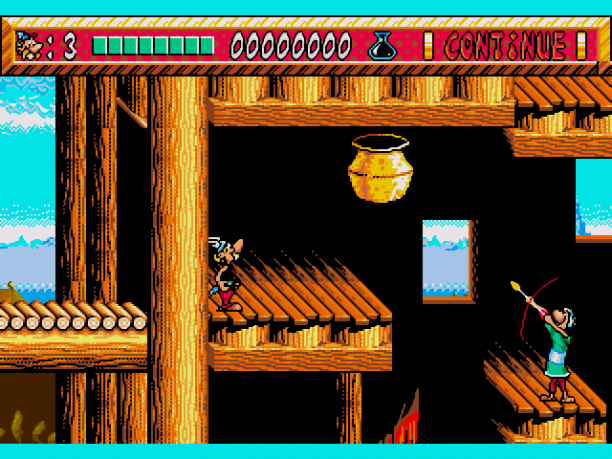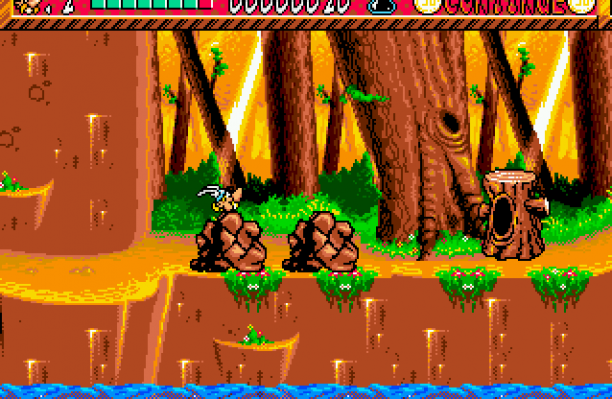
On Her Majesty’s Sega Mega Drive
Asterix and the Power of the Gods Review
This week’s edition of On Her Majesty’s Sega Mega Drive is an oddity. As we know by now, this series covers Mega Drive games that never made it into America, but saw an audience in the UK. Usually, the reason for this is that the game in question based on a franchise that’s madly popular in Britain, but non-existent in America. Yet, today, we have this: Asterix and the Power of the Gods, developed by Core Design shortly before they hit the big time with Tomb Raider. Asterix, while not unheard of, is a definite French comic book icon (much like Tintin), making a UK release a slightly odd choice –a bit like releasing a Beano game in continental Europe.
A quick explanation for those who don’t know: Asterix (better known in the original language as Asterix le Gaulois) is a Gaul (a race of Celtic people who inhabited what would become modern-day France), and he, along with his countrymen, resist the pressing Roman Empire. However, being a comedic series, the comics are filled with hijinks and tongue-in-cheek bits of humour as Asterix and Obelix go about their adventure. At least, this is about as much as I can ascertain from it; despite studying French at school for 7 years, I haven’t read a single page of it – so I’m going into this game as blind as you might be.
The story of the game is told through cuts scenes rendered as comic book panels. A neat idea – certainly not an original one, but definitely cool to see on the Mega Drive. Core Design have upheld the raw visual style of the source material, and it ends up looking great in 16-bit form. The story of Power of the Gods is that the Romans have finally succeeded in taking over from the Gauls, and it’s up to Asterix to step in and drive the Romans out. Not exactly an inspired piece of storytelling, but absolutely fine for this purpose: to set up a game plot that leads to solid gameplay involving tearing Roman enemies a new one.
Power of the Gods takes form as an interesting blend: part side-scroller, part open-world; you’re given the option to take on the game’s levels as you like in any order you wish, which lends a great sense of freedom and choice to the game, and really lends to the aspect of ‘epic adventure’ that the developers seemed to be shooting for. Helping with the aspect is the game’s overworld, which shows Asterix’s progress through the world as you make your way through the game.
However, despite the good intentions of the developers, this game is, to get down to brass tacks, not much fun at all. Mechanically, it’s solid; punching, jumping and running all work robustly, but the end result all feels bland and uninspired – essentially the same platformer you’ve seen a billion times before. That’s not to say it’s bad, heavens no, but it’s uninspiring and average to the point that it gets saddled with that damning label, “one for the fans”, which really just means it’s only vaguely interesting enough to hold the interest of existing Asterix fans. Strip it to its bare bones, and it’s just mediocre.
This game takes an interesting route in relation to its music. Instead of original in-house productions inspired by music of the time, or a sound team led by a pioneering musician, we’ve instead been given 16-bit version of public domain classical tracks such as William Tell Overture, and their implementation is as sweet as the Moonwalker soundtrack on Mega Drive. Playing through, you may well find these recreations of beloved tracks to be the best part of the game, as they hold the player’s interest through what is admittedly a weak and uninspired sidescrolling platformer.
However, while the soundtrack is a treat, the graphics are conversely unexciting. Yes, they do a fair job of bringing Asterix’s world to life, but the game never looks special – it never takes the player aback, never convinces them that what they’re looking at is a rarity. What we’re left with is a run-of-the-mill looking game that never lives up to the source material. Having said that, though; Asterix and The Power of the Gods is at least heavy on colour, meaning that looking at the game is at least tolerable.
Asterix and the Power of the Gods is not a great game. Sure, some enjoyment may be gleaned out of it, but ultimately, there are better platformers out there. Still, it’s not a bad one…for the fans.

